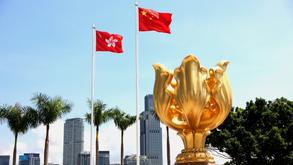 This photo shows the Golden Bauhinia Square in Hong Kong, July 14, 2020. (PHOTO / XINHUA)
This photo shows the Golden Bauhinia Square in Hong Kong, July 14, 2020. (PHOTO / XINHUA)
HONG KONG - Top Hong Kong officials have thrown their weight behind a proposal in the nation’s top legislature to apply the nation’s anti-sanctions law in the special administrative region by adding the legislation to Annex III of the Basic Law, the SAR’s constitutional document.
Their support came as top national lawmakers are expected to deliberate the motion during their four-day session in Beijing that begins Tuesday. The Standing Committee of the National People’s Congress will also discuss adding national legislation to Annex III of the Basic Law of the Macao SAR for local application, according to the NPC’s website.
Hong Kong Financial Secretary Paul Chan Mo-po said on Sunday that the SAR has a “constitutional obligation” to adopt the law, as the United States has repeatedly interfered in Hong Kong affairs in a bid to suppress the nation’s development.
HK Financial Secretary Paul Chan Mo-po said the anti-sanctions law aims to provide more-diverse countermeasures in the “policy toolbox”, and it intends to restore the normal order of the market and protect the development interests of individual enterprises
The US imposed unreasonable sanctions on officials of the central and HKSAR governments, ended special tariff treatment for Hong Kong-made goods, and installed controls on technology exports to the SAR, Chan said in his weekly blog. These acts are intended to seriously disrupt Hong Kong’s business environment, and such “bullying” is intensifying, Chan wrote.
The US has imposed a number of sanctions against Chinese individuals and organizations, citing alleged human rights violations in the HKSAR and the Xinjiang and Tibet autonomous regions. In response, the NPCSC passed the anti-sanctions law on June 10 to counter foreign policies that extend the long arm of foreign domestic laws aiming to restrict Chinese entities.
The 16-article law states that the State Council, China’s cabinet, can put foreign individuals or organizations on a sanctions list if they are found to have violated international law and basic norms of international relations; used excuses or their own laws to contain or suppress China; taken discriminatory restrictive measures against Chinese citizens or organizations; or interfered in China’s internal affairs. The countermeasures include denial of entry into China, and the freezing of assets.
Chan said the anti-sanctions law aims to provide more-diverse countermeasures in the “policy toolbox”, and it intends to restore the normal order of the market and protect the development interests of individual enterprises.
ALSO READ: Commerce chief: Anti-sanctions law to safeguard HK businesses
At a news conference on Wednesday, Hong Kong Secretary for Commerce and Economic Development Edward Yau Tang-wah said the anti-sanctions legislation is a “natural response” to the blatant interference of the US. “It is also a matter of upholding the rights of people doing business in Hong Kong to act against such unwarranted interference,” he said.
Hong Kong Secretary for Commerce and Economic Development Edward Yau Tang-wah said the anti-sanctions legislation is a “natural response” to the blatant interference of the US
Yau said he was glad to see that, knowing the actual situation in Hong Kong, the international business community is taking a very pragmatic approach. It also reflects the fundamental truth that Hong Kong remains an open, competitive and attractive place for business and investment, he said.
During a weekly press briefing on Aug 10, Hong Kong Chief Executive Carrie Lam Cheng Yuet-ngor vowed to cooperate with the central government in applying countermeasures against foreign sanctions. It’s the SAR’s constitutional duty to safeguard national security and development interests, she said.
Earlier this month, Secretary for Justice Teresa Cheng Yeuk-wah said in her weekly blog that the so-called sanctions by foreign countries are indeed “unilateral coercive measures” that are “contrary to international law and the United Nations framework, and also violate the principle of non-intervention under international law”.
In expounding the legitimacy of the law, Cheng raised the question of why a state or group of states should be allowed to impose unilateral coercive measures against other states without facing any consequences.
Cheng criticized those foreign sanctions as politically motivated attempts to intervene in a country’s internal affairs and sovereignty.
READ MORE: HK justice chief backs anti-sanction law
She also criticized anti-China disruptors who seek foreign sanctions against China and the city, which are “abominable and contemptible” acts that true patriots would never do.


